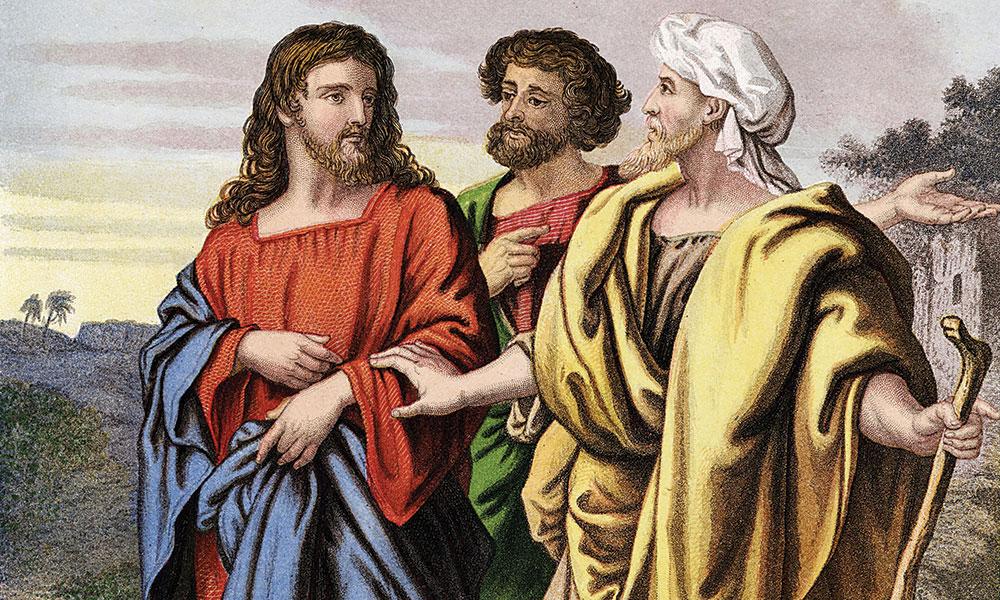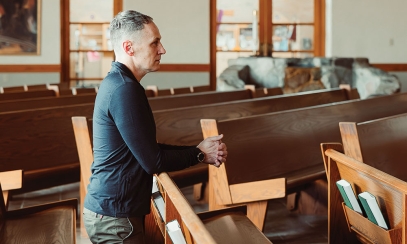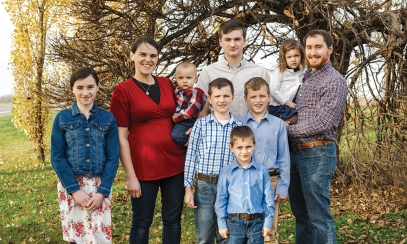
On the Road to Emmaus with Bishop Boyea
On Corpus Christ Sunday this June, the Diocese of Lansing embarks upon a Year of Eucharistic Revival. It’s all part of the National Eucharistic Revival currently underway across the United States. So why the need for “Eucharistic Revival”? The director of the Office of Worship for the Diocese of Lansing, Jeremy Priest, explains:
On Corpus Christ Sunday this June, the Diocese of Lansing embarks upon a Year of Eucharistic Revival. It’s all part of the National Eucharistic Revival currently underway across the United States. So why the need for “Eucharistic Revival”? The director of the Office of Worship for the Diocese of Lansing, Jeremy Priest, explains:
Over the past 60 years, the number of Catholics who attend Mass on Sundays has dwindled. Confession lines have shrunk dramatically. The number of people becoming Catholic has continued to decline across the country.
Meanwhile, a Pew Research Center survey in 2019 revealed that almost seven in every 10 Catholics did not believe that the bread and wine brought to the altar at Mass become the body and blood of Jesus Christ. Perhaps it was the way the survey was worded, but most people said that the bread and the wine received at Mass “are symbols of the body and blood of Jesus Christ.” Moreover, almost half of the people surveyed did not even know the Church teaches that the bread and wine are anything more than mere symbols.
How is it possible that so many don’t even know what the Church teaches? Why is it not widely understood that which is, perhaps, best summed up by the Fourth Council of the Lateran in 1215:
“By the consecration of the bread and wine there takes place a change of the whole substance of the bread into the substance of the body of Christ our Lord and of the whole substance of the wine into the substance of his blood.”
Many Bible-believing Christians who choose to become Catholic do so precisely because in the Catholic Church they know they will receive Jesus’ real presence in the Blessed Sacrament: body, blood, soul and divinity. Many Catholics are Catholic — and remain Catholic — because of Jesus’ real presence in the holy Eucharist.
A National Eucharistic Revival
Many U.S. bishops saw this lack of belief not only as a crisis of faith but also as an opportunity for rediscovering Christ’s real presence in the Blessed Sacrament. Initially prompted by the Pew Research Center survey, the U.S. Bishops launched what they call a National Eucharistic Revival. For many, this crisis of faith and opportunity for rediscovery will call to mind these words of the 20th century English author J.R.R. Tolkien, written to his son, Christopher:
Out of the darkness of my life, so much frustrated, I put before you the one great thing to love on earth: the Blessed Sacrament. ... There you will find romance, glory, honor, fidelity and the true way of all your loves on earth, and more than that: death. By the divine paradox, that which ends life, and demands the surrender of all, and yet by the taste — or foretaste — of which alone can what you seek in your earthly relationships (love, faithfulness, joy) be maintained, or take on that complexion of reality, of eternal endurance, which every man’s heart desires.
On the Road to Emmaus
Beginning this June, on the Solemnity of the Body and Blood of Christ, the Diocese of Lansing will launch a year of eucharistic revival that will culminate in a Corpus Christi procession through the streets of Lansing in June of 2024. This, in turn, will lead us to the National Eucharistic Congress in Indianapolis in July of 2024. Bishop Boyea has designated the theme of our Diocese of Lansing eucharistic revival as On the Road to Emmaus. The reference to Emmaus brings us face to face with two disciples described in the Gospel of St. Luke, which reads thus:
Disheartened by Jesus’ death and bewildered that someone might have taken his body from the tomb, they make their way out of Jerusalem for the distant village of Emmaus. On their journey to Emmaus the hearts of these disciples burned within them as the mysterious man walking beside them opened the scriptures to them. Arriving at their destination, they urged the man to remain with them. It was then, at table, as they received the bread Jesus gave to them, that he vanished from their sight. Even as he vanished, Jesus — Emmanuel, “God with us” — abided with them in the bread become his body. These two disciples, awestruck, hurried back to Jerusalem to find the apostles and shared how Jesus was made “known to them in the breaking of the bread.” (Lk 24:35)
Throughout the upcoming year, from Corpus Christi 2023 to Corpus Christi 2024, Bishop Boyea will lead us On the Road to Emmaus through all the parts of the Mass, drawing us more deeply into the mystery of the new covenant in Christ’s blood.
As has become his custom, Bishop Boyea will issue weekly “training in holiness” challenges for us. In addition, we will regularly hear from eucharistic witnesses — people in our own parishes whose lives have been changed and continue to be transformed by encountering Jesus in the Mass. Lastly, we will be formed by the words of some of the Church’s greatest saints on the Eucharist. One of these holy witnesses, St. Teresa of Calcutta, will lead us into the final aspect of the Eucharistic Revival. She said:
“Unless we believe and see Jesus in the appearance of bread on the altar, we will not be able to see him in the distressing disguise of the poor.”
Sent Forth on Mission
If we are On the Road to Emmaus for these 12 months, it is only so that we, like those intrepid disciples of so long ago, can rush out to tell others what we have found.
Like the martyrs of Abitene, we can say, “Without Sunday we cannot live.” Indeed, from the National Eucharistic Congress in 2024 through Pentecost of 2025, the entire Church in America will be sent on mission to share the Gospel of Jesus Christ. It is our hope that if our year spent On the Road to Emmaus impresses anything upon us it will be, in the words of the Second Vatican Council, that the “aim and object of apostolic works is that all who are made sons of God by faith and baptism should come together to praise God in the midst of his Church, to take part in the sacrifice, and to eat the Lord’s supper.” (Sacrosanctum Concilium, 10)



